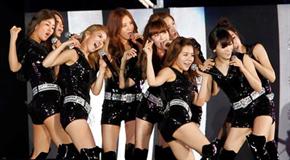Girls Rule
It’s sold more than 500,000 copies so far, a record for a foreign debut in Japan.
The group’s Aug. 20 performance in Niigata on the Japan Sea coast to benefit the victims of the March 11 earthquake received a lot of positive publicity. Next is a three-night stand starting Sept. 1 with other K-pop acts at Tokyo Dome, which holds 55,000.
In a recent interview with CNN, the nine-member group revealed that Japan is just the start of a concerted push for international recognition.
They’ve already performed well-publicized showcases in Los Angeles, Shanghai and Paris, and hinted that South America is also in their sights.
As yet, no K-pop act has made the full crossover into general pop stardom in the West. Though many K-pop artists play concerts in America and Europe, the audiences are predominantly Korean expatriates and local Asian pop cultists or people with Korean family connections. But with two members of Girls Generation being born in the U.S., they at least have a head start in mastering English.

The success of Girls Generation has intensified the competition of K-pop girl groups in Japan. Rainbow, a six-member group that has been around since 2009, is about to release its debut single, “A,” in Japan, and right now is benefiting from some reverse publicity.
The video for the single has been restricted in South Korea because the dancing is considered too sexually suggestive. Japanese media have covered the video extensively.
Girls Generation is also making inroads in another country, though one where they may never perform. According to the Dong-a Ilbo newspaper, K-pop is an underground sensation in North Korea. Because the majority of the Communist country’s population is impoverished, the trend is mostly limited to the children of “higher-income families,” meaning people with strong connections to the North Korean leadership.
A Chinese businessman who often visits Pyongyang told U.S.-based Radio Free Asia that a well-to-do housewife asked him to bring back a Girls Generation CD for her daughter.
The report went on to say that children in Pyongyang who cannot do the latest K-pop dances are often ostracized. There are even private lessons available.
South Korean and Western pop is banned in North Korea, though defectors have repeatedly said it is widely available among the elite.
Nevertheless, as the North Korean leadership prepares the way for the succession of Kim Jong-un, the son of current leader Kim Jong-il, it is likely that the authorities will crack down on illicit music, says the newspaper.
 Daily Pulse
Subscribe
Daily Pulse
Subscribe

